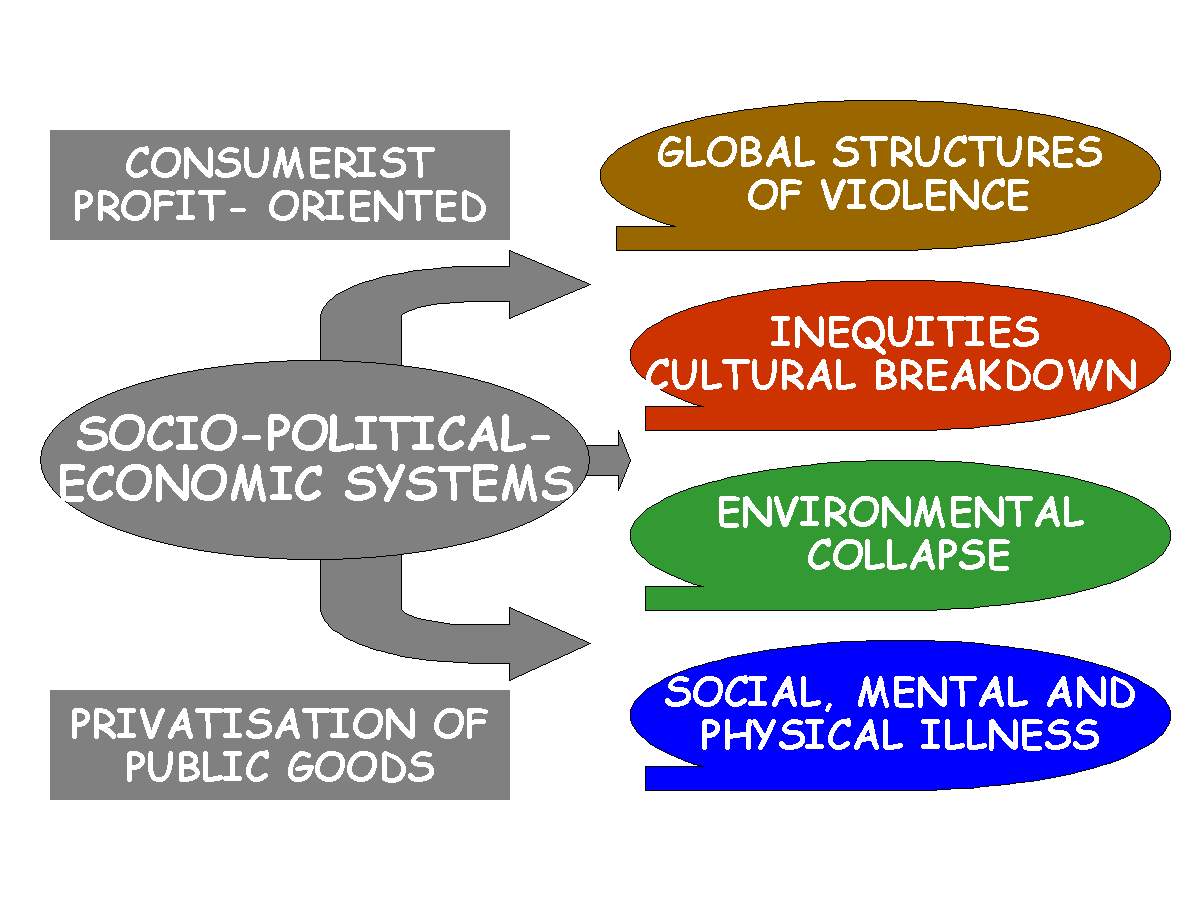Abstract
The evils attributed to the “Anthropocene” are not the responsibility of all humanity; the main culprits, who have the political and economic power to shape the forms of production and consumption and define lifestyles, must be distinguished from the majority of the population, whose power to change things cannot be compared with those. “Systemic” interpretations, supported by theories of “complexity” and the “Anthropocene” as a new era in human history, may inadvertently obscure the role and effective action of people and groups that control economics and politics in today’s world, who find an easy excuse to decline their responsibilities in the destinies of humanity and shrewdly disguising the clandestine agendas of powerful economic and intelligence institutions. Does the Anthropocene narrative and conceptualization foster the political action needed for tackling the environmental destruction?
Today’s world is associated with environmental degradation, predatory exploitation of natural assets, deforestation, desertification, loss of biodiversity, global warming, uncontrolled waste and geopolitical hegemonies related to oil and gas; climate calamities, object of repeated scientific events, become evident and are continuously witnessed by ordinary people.
There is a dissonance between the legal framework, international conventions and the practices of political and economic groups that endorse the abuse of nature, devastating huge areas through logging, mining, industrial chemical production and “commodities”; indigenous and preservation areas are constantly at risk of invasions and territory displacement.
The “Anthropocene”, presented as a geological time when human activities have changed how the planet operates (nuclear testing, widespread use of oil, coal, chemicals and fertilizers), have let evidences everywhere, as established by the International Commission on Stratigraphy in the Earth’s rock formations and in distinct lines in sediments every year.
Although it received little acceptance among ecologists and geologists, the term “Anthropocene”, as proposed by chemist Paul Crutzen and biologist Eugène Stoermer at a meeting of the International Biosphere-Geosphere Program, was adopted as the beginning of a “new geological epoch”, in view of evidences collected by different researchers.
The Anthropocene argument was called “a conceptual and historical mess, a neo-Malthusian view of population, a fanciful historical interpretation” (Moore, J.W., 2022). It is not just about a word, but a misleading way of understanding and dealing with things, affecting communication, advocacy, public policies, research and teaching programs worldwide.
However, the evils attributed to the “Anthropocene” cannot be the responsibility of all humanity, since the main culprits, who have the political and economic power to shape the forms of production and consumption and define cultural lifestyles, must be distinguished from the majority of the population, whose power to change things cannot be compared with those.
“The idea that everyone is to blame for damage to ecosystems and climate change hides the real culprits”, says S. Falzi. an ecologist and UN environmental negotiator: we are in the era of the “corporatocene”, another term for the “capitalocene”, that is, capitalism, as a perverse way of organizing relations of exploitation between man and nature.
If responsibility is attributed indiscriminately to all of humanity or to the complexity of contemporary life (systemic approaches), political and economic actors would be exonerated from their responsibilities. The selective disposal of waste by households does not exempt packaging industries from producing it (cardboard, bags, plastic, etc.).
Systems thinking is proposed to understand and deal with many problems, and expand the range of options for dealing with them. The focus is not on isolated variables, but on the interconnections between them, as they combine to produce the phenomena, interweaving different dimensions of being worldly (intimate, interactive, social, and biophysical).
However, “systemic” interpretations, theories of “complexity” and the “Anthropocene” as a new era in human history, may inadvertently obscure the role and effective action of people and groups that control economics and politics in the world, who thus find an easy excuse to decline their responsibilities regarding today’s problems and lingering crises.
Could the “system” explain everything, or is something missing from this equation? The verdicts of international courts could clarify many conceptual frameworks, by correctly identifying individuals, who, within a “system”, commit crimes and atrocities, not only in wars, but also in different environmental, social, political and economic circumstances.
The systemic analysis does not apply, for example, to the problem of population concentration in large cities, which occurs due to priority given to the extensive areas used for commodities plantations and cattle raising, to the detriment of the development of small towns and rural areas for family farming, as an option for the production of organic food (fruits and vegetables).
There are no complex problems, but problems that become complex. “Because everything has become problematic, everything is also a matter of indifference” (Sloterdijk, P., 2022); “If humanity’s technological progress can be compared to climbing a mountain, then the Anthropocene finds us perched on a crumbling ledge (Kirsch, A., 2023).
Contemporary crisis, involving the environment, economy, society and politics.”imply a fundamental transformation of values, beliefs and social practices in many sectors of society” (Lidskog, R. et al., 2022), calling for a “redeeming change”, a transformation that cannot be confused with “techno-scientific fixes” and vigilance devices by business corporations.
The inequalities of wealth and opportunities, the circumstances that prevent people of lower socioeconomic status from going beyond the daily concerns of survival, add to the indifference of the richest people, who, immersed in the profitable “world of business”, remain concerned only with maintaining the “panorama” in which they are inserted.
In a world stripped of moral principles, in the absence of things that really matters in life, the conspicuous consumption of goods widely trumpeted as a sign of status and prestige in the “anything goes” of advertising campaigns, has tempted young people from the less favored populations to go to crime to get things valued by the “system”.
The consumption of narcotics is a symptom of the “general phenomenon”, of the deficient attention to the physical, social and mental health of entire populations, of an economic, political, cultural and educational crisis, aggravated by the lack of structured services and community participation to deal with the problems before they get chronical.
The proliferation of automobiles or trucks, the construction of highways, are directly linked to public policies that neglected locomotion on rails (passengers and cargo), as well as public transport in cities and between cities, which is still a competing means of transport in different countries of the world. Is it only up to citizens to leave their cars at home?
What is in cause is the “general phenomena”, the “world-system”, with its boundaries, structures, techno-economic paradigms, support groups and rules of legitimization. Problems are deep inside the “boiling pot”, not in the “bubbles” of the surface, object of fragmented public policies, reduced academic formats, mass-media headlines or public outcry.
Scientific efforts, teaching and learning, public policies, advocacy, communication, goals and new paths to reach them, should contemplate a set of values, norms and policies that prioritizes socio-ecological objectives, human well-being, natural and built environments, the aesthetic, ethical and cultural meaning and responsibilities of “being in the world” (Pilon, A. F., 2023).
Socio-ecological transitions, societal transformations, politics, economics, education, Earth and human revival, as faces of the same coin, depends on an ecosystem approach combining all dimensions of being in the world (intimate, interactive, social and biophysical), as they interact, as donors and recipients, to induce the events, suffer the effects and induce the changes.
Eliciting events and changes depends of the synergic interaction of all dimensions of being in the world taken altogether: intimate, interactive, social and biophysical These relationships imply a panorama intermingling relationships with oneself, relationships with groups, relationships with society at large and relationships with the environment.
Localism describes a range of political philosophies which supports local production and consumption of goods, local control of government, and promotion of local history, local culture and local identity, giving the power into the hands of local councils, communities and individuals to act. Localism can be contrasted with globalization by corporations.
The United Nations Secretary-General urged world leaders to present a “Rescue Plan for People and Planet” (SDG Summit, 2023), taking into account national and global commitments to inclusion and sustainability, in view of the impact of incessant “natural” disasters and interconnected political, social, economic and environmental widespread crises in today’s world.
This would imply the permanent vigilance over global conventions and international pacts, on the implementation of legislation and on the actions of politicians, who may place private interests above the public good, in view of the intense lobbying of business corporations and the fleeting glare of the media headlines on issues always reiterated but never solved.
In the face of rapidly increasing global climate and environmental problems (first, do no harm), the Alliance of World Scientists (AWS), as a collective international responsible voice, is calling on the world’s scientists to become signatories to a document in the face of the present emergency situation, turning accumulated knowledge into action,
As long as profitable policies and practices remain unchanged (business as usual), a series of political, economic, social and environmental problems cluster and worsen around the world and have a synergistic effect, reinforcing each other. This would define the current era, that some scholars classify as the “corporatocene“ or “capitalocene“ era.
This would imply the permanent vigilance over global conventions and international pacts, on the implementation of legislation and on the actions of politicians, who may place private interests above the public good, in view of the intense lobbying of business corporations and the fleeting glare of headlines on segmented issues,
Problems are deep inside the “boiling pot”, not in the “bubbles” of the surface (fragmented public policies, reduced academic formats, mass-media headlines or public outcry). What is in cause is the “general phenomena”, the “world-system”, with its boundaries, structures, techno-economic paradigms, support groups and rules of legitimization.
Scientific efforts, teaching and learning, public policies, advocacy, communication, goals and new paths to reach them, should contemplate a set of values, norms and policies that prioritizes socio-ecological objectives, human well-being, natural and built environments, the aesthetic, ethical and cultural meaning and responsibilities of “being in the world”
Universities cannot remain neutral and refrain from taking a stand on issues facing the societies they are supposed to serve, but they have a duty to uphold core values such as social inclusion, scientific truth, ethical values, responsible research, and global solidarity (University World News: ‘’By imposing silence, universities betray their mission“).
Instead of trying to appease voters, shareholders and politicians with the least disruptive approach possible, genuine systemic change is needed. Environmental degradation, plastic pollution and carbon emissions will continue to worsen until policies that, among other things, encourage investment in fossil fuels and global subsidies allocated to them.
Scientists and scientific advisers should take every opportunity to come alongside politicians to debate with them in public bodies and media (broadcasting, television and the press) and freely express their opinions on current issues, especially when contaminated by dominant political and economic interests in contradiction to scientific evidence.
References:
Kirsch, A., 2023. The Revolt Against Humanity: Imagining a Future Without Us, Columbia Global Reports.
Lidskog, R. et al., (2022). Environmental expertise for social transformation: roles and responsibilities for social science, Environmental Sociology, 8(3), 255-26. https://doi.org/10.1080/23251042.2022.2048237
Moore, J.W. (2022). “Power, Profit and Prometheanism, Part I: Method, Ideology and the Violence of the Civilizing Project,” Journal of World-Systems Research 21(2), 415-426.
Pilon, A. F., Reframing Relationships between Humans and the Earth: The “Anthropocene”, a New Ideology to Justify the Status Quo? MPRA Munich Personal RePEc Archive, 2023. https://mpra.ub.uni-muenchen.de/119041/1/MPRA_paper_119041.pdf
Sloterdijk, P. (2022). Neither sun nor death, Cambridge University Press.


